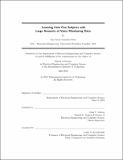Learning from few subjects with large amounts of voice monitoring data
Author(s)
Gonzalez Ortiz, Jose Javier.
Download1124923508-MIT.pdf (3.905Mb)
Other Contributors
Massachusetts Institute of Technology. Department of Electrical Engineering and Computer Science.
Advisor
John V. Guttag.
Terms of use
Metadata
Show full item recordAbstract
Recently, researchers have started training high complexity machine learning models for clinical tasks, often improving upon previous benchmarks. However, more often than not, these methods require large amounts of supervision to provide good generalization guarantees. When applied to data coming from small cohorts and long monitoring periods these models are prone to overt to subject-identifying features. Since obtaining large amounts of labels is usually not practical in many scenarios, expert-driven knowledge of the task is a common technique to prevent overtting. We present a two-step learning approach that is able to generalize under with few subjects and without expert-driven feature design when applied to a voice monitoring dataset. Our approach decouples the feature learning stage and performs it in an unsupervised manner, removing the need for laborious feature engineering. We show the eectiveness of our proposed model on two voice monitoring related tasks. We evaluate the extracted features for classifying between patients with vocal fold nodules and controls. We also demonstrate that the features capture pathology relevant information by showing that models trained on them are more accurate predicting vocal use for patients than for controls. Our proposed method is able to generalize to unseen subjects and across learning tasks while matching state-of-the-art results.
Description
This electronic version was submitted by the student author. The certified thesis is available in the Institute Archives and Special Collections. Thesis: S.M., Massachusetts Institute of Technology, Department of Electrical Engineering and Computer Science, 2019 Cataloged from student-submitted PDF version of thesis. Includes bibliographical references (pages 41-45).
Date issued
2019Department
Massachusetts Institute of Technology. Department of Electrical Engineering and Computer SciencePublisher
Massachusetts Institute of Technology
Keywords
Electrical Engineering and Computer Science.